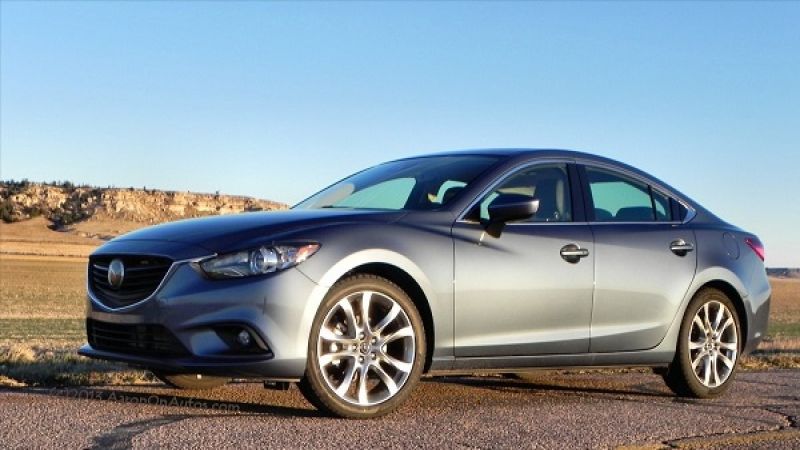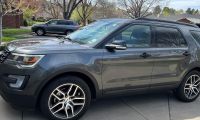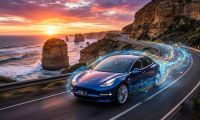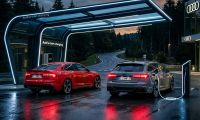Mazda announced today the Mazda 6 diesel, which had been scheduled for introduction here in the coming months, is not coming to America now, and Mazda does not have any timeline for the car to be introduced here. As an explanation Mazda said that “…the launch of its SKYACTIV-D clean diesel engine in North America is being further delayed from its Spring 2014 announced debut timing…it was decided that further development is required to deliver the right balance between fuel economy and Mazda-appropriate driving performance.” With regard to when the car might be ready Mazda says “Further information on the program, including a timeline of launch for North America, technical specifications and fuel economy will be available at a later date, closer to launch.” Something’s up and Mazda does not want to say what.
The current 2014 Mazda 6 sedan achieves an impressive highway mileage of 40 MPG with its gasoline engine. Its overall 32 MPG rating is also great for a relatively large family sedan. While not really a fast car, the automotive press is overwhelmingly impressed with the car and it is often cited as the best car in its class for enthusiasts. That class is four cylinder affordable sedans, not sports sedans. However, about a year ago word got out that Mazda had a great diesel engine that could make the Mazda 6 one of the most fuel efficient non-hybrids in America if it were introduced here. Mazda also took the diesel racing to keep fans interested, further develop the engine, and to keep the car in the headlines.
Mazda wants to market the diesel as a green car, and in fact calls it the “SKYACTIV-D clean diesel engine.” However, as we have often reported here there is no basis for diesels to be called clean or green. With regard to the green claim, diesels don’t emit less CO2 per mile than do their gasoline counterparts in the market. The 2014 Passat Diesel automatic can achieve 40 MPG highway and 34 MPG combined. It produces 290 grams of CO2 per mile, while the gasoline Mazda 6 automatic produces just 275 grams of CO2 per mile. So if diesels put out more greenhouse gasses it is hard to call them green cars. Furthermore, in each barrel of crude oil refiners can produce about 19 gallons of gasoline compared to about 11 gallons of diesel. Therefore, more oil is needed per mile to propel a diesel car. More oil used and more CO2 produced does not equal green.
We have also compared the cost per mile to drive a diesel versus a gasoline car and have found that in family cars the gasoline cars are less expensive. Diesel engines do sometimes have a slight edge in mileage over contemporary gasoline engines, but the fuel costs more. Typically diesel costs about 10% more than regular gasoline, which is what almost all mainstream passenger cars use today. More CO2, more oil used, and more expensive to drive is hardly a recipe for widespread success. Hopefully we will find out at some point exactly what the Mazda diesel can really do, but for now Mazda does not even have a launch date.
Mazda’s new diesel may be slightly more fuel efficient than Volkswagen’s but we have no US based test evidence that it is. Volkswagen has had the most experience with diesel vehicles in America in terms of number of models, years produced, and units sold. Mazda’s comments about the diesel not yet having the right balance of “fuel economy and Mazda-appropriate driving performance” makes us wonder if the car can’t beat the gasoline car’s already excellent efficiency and CO2 emissions.
Related Story:
2015 Volkswagen Golf TDI vs. Toyota Corolla LE Eco – Efficiency meets economy
Photo of 2014 Mazda 6 courtesy of Aaron Turpen.
Set Torque News as Preferred Source on Google












Comments
Hi MR. I'm not sure what we
Permalink
In reply to John, I understand that you by Michael Reiche (not verified)
Hi MR. I'm not sure what we are arguing at this point. The story is about affordable family cars and how there are no diesels in the US market that are more fuel economical than the leading gasoline offerings in that same class. I'm not sure how to argue the premium cars and crossovers below. Audi S5 in diesel is not listed yet as a 2015, nor was it in 2014 in fueleconomy.gov. The A5 Quattro (AWD) gets 26 MPG combined. : http://www.fueleconomy.gov/feg/PowerSearch.do?action=noform&path=1&year1=2015&year2=2015&make=Audi&model=S5&srchtyp=ymm. - - The 2015 ML350 gets 20 MPG. No diesel listed for it either. The 2015 BMW 320i (2 liter gas turbo) gets 28 combined. The 2014 BMW 328d (2 liter diesel turbo) got 32. No 2015 listed yet. That example of a premium compact sedan is an advantage of 12.5% for diesel. About the added cost of the fuel. However, for cars that size, 32 MPG is not remarkable (back to the Mazda6 again). - - Are we going to convince one another? Doubtful. Maybe it's time we agree to disagree. I hope you will keep challenging future stories. Your passion is inspiring and I appreciate the dialogue.
I own a '14 passat tdi with a
Permalink
In reply to Please provide your specific by John Goreham
I own a '14 passat tdi with a 6spd manual. 30% is about right.
Most, if not all gas engined cars have to be babied to even get close to their epa ratings. Where as all small diesels exceed them by a significant margin.
I drive 120 miles each way to work and average 52 to 57 mpg in my car religiously. That is waaaay above the 41mpg epa rating. That is 22 to 30% better, every day. Now add to that the 10% average below epa ratings that a gasser gets (due to the fact that driving at 75 eats more gas than the epa test rating of ~55mph) and the difference gets larger.
I get 40mpg driving around town without even trying.
my wife drives a passat tdi as well. She gets 45 mph religiously. Her last car was a camry that got 25mpg like clock work (great car but boring) that is an 80% increase in fuel economy. She now fills up 1 per week instead of twice and saves about 200 bucks per month.
I will say this (these?)
Driving a diesel makes you drive more efficiently.
i was very impressed with the gas jetta i drove when my car was in for its 10k service. It had a 1.8turbo (35mpg rated) i managed to squeze 40mpg out of it. It also pulled like a diesel from idle.
The mazda 6 is a gorgeous car. I would consider a diesel version of it.
after driving many different cars in my life, and now owning my first diesel, i will be driving diesels from now on. My wife agrees.
i now know why all those people were driving those mercedes diesels.
And to think i used to laugh at them. I am now one of them.
My test car this week is a
Permalink
In reply to I own a '14 passat tdi with a by Rob (not verified)
My test car this week is a 2015 VW Golf TDI S with the DSG trans. I have just completed a 164 mile loop which was 100 miles highway, 64 miles suburban driving. None of it in traffic. 40-50F this week no rain. With no AC, using cruise, and never exceeding 70 (except for very short passing) I just recorded 41.9 MPG. In similar driving in the Toyota Corolla I recorded 43.5 MPG. In a Mazda3 my MPG was similar to the Golf. Here's the interesting part. I took a photo of the "Average MPG" that the Golf displayed over the 100 mile highway loop. The car says I averaged 56.1. I took a photo. My conclusion form my own testing of diesel vehicles is that they do very well on fuel and are fine drivers. They just don't beat the best gasoline engines in their class. Regular unleaded was 2.89 and diesel 3.35 today where I filled up in Walpole MA. Later this week I hope to do a 100 mile all-highway loop and fill up before and after to see how the mileage is and to see if the car's display is off significantly.
Rob, just did an all- highway
Permalink
In reply to I own a '14 passat tdi with a by Rob (not verified)
Rob, just did an all- highway test and got great results. I plan a new story for next week. I will include your comments above (in an entirely positive way) and the story will be neutral. Not a slam of diesels. Thanks for sharing. Mine was DSG, so the yours being a larger car and a stick gives a great example of other affordable VW drivetrain performances on the highway. Story will be in week of Dec 1. Cheers,
They title of the article is
Permalink
They title of the article is "Why can't the 2015 Mazda 6 diesel work in the US?", and while I agree we may never see it, I disagree with the reasons given.
<br>
Typo - should be A6 instead of S5. 2014 Audi A6 - 29mpg vs 22mpg (32%)
<br>
"The 2015 ML350 gets 20 MPG. No diesel listed for it either" - and this is why indicated 2014, where the diesel is 21% better.
<br>
"The 2015 BMW 320i... No 2015 (diesel) listed yet - and this is why I indicated 2014.
<br>
Furthermore, I have yet to find any model of automobile which is identical except for the gas/diesel engine where the gas engine uses less fuel. Perhaps if such a vehicle existed, I would be more accepting. Taking into account the cost of the fuel, there is always a price point where one can claim that gas engined model is cheaper to run, but again, I have not found that price point to exist.
<br>
There are two significant areas where gas cannot best diesel (1) diesel has 15% more energy by volume; and (2) diesel engines of comparable size have close to double the torque as gas engines - that's the reason that large trucks in the US are diesel. Looking at the Honest John website (actual fuel consumption reported by owners in the uk), one will find that diesel Mazdas showing about 14% better fuel economy than their gas-powered counterparts.
<br>
As for CO2 emissions mazda uk -> /aboutmazda/news/technology/when-size-doesnt-matter-with-co2-emissions/ reports the diesel Mazda6 emits less CO2 (108 g/km -> 172 g/mile) - considerably less than the the 275 g/mile reported in this article (can that be right? Do they measure CO2 differently?)
Google on :
Permalink
Google on :
2015 VW Golf TDI MPG
I know your comment was a
Permalink
In reply to Google on : by Michael Reiche (not verified)
I know your comment was a while back, but it turns out I have a 2015 Golf TDI with the DSG this week. EPA estimated 36 combined, 43 highway. See above comment for more. My testing is 41.9 over 164 miles of 2/3 highway, 1/3 suburban driving. Where's the amazing mileage? Same as Corolla LE Eco or Mazda 3 as far as I can tell. And the diesel fuel is 11% more expensive. The Corolla emits less CO2 as well.
from fueleconomy.gov
Permalink
In reply to I know your comment was a by John Goreham
from fueleconomy.gov
2015 Golf TDI 2.0 - manual 6spd - 30/36/45 mpg.
2015 Golf gas 1.8 - manual 5spd - 25/30/37 mpg.
When comparing apples-to-apples, diesel uses about 20% less fuel. Figure in the difference in fuel price, and it's a 9% improvement.
Cruze Eco - 28/33/42 mpg
Mazda3 - 30/34/41 mpg
When comparing apples-to-oranges, diesel fuel economy is about 8% better, figuring in the price of fuel, the Cruze Eco and Mazda3 are cheaper to run. The Golf TDI has about 60% more torque.
In case any readers got this
Permalink
In case any readers got this far (!) there is a comprehensive comparison of the 2015 Corolla and Golf TDI you may enjoy at this new link: http://www.torquenews.com/1083/2015-volkswagen-golf-tdi-vs-toyota-corolla-le-eco-efficiency-meets-economy
Mazda has been claiming to
Permalink
Mazda has been claiming to have "fixes" for their diesel problems since 2006. It's all BS -- the problems are inherent in the design, as we have found to our great cost. No informed buyer in Australia or Europe
will take on a Mazda diesel second-hand. Expect it to be worthless in about 100,000km, when the diesel particulate filter fails and the vehicle goes into "limp mode". Mazda quoted almost $9000 to replace the filter on our wagon, but we hadn't set aside the $60 a week (over three years) required to replace it. We also had recurrent problems with the front brakes, injectors and turbocharger, and the air-conditioning died completely (twice). A complete financial disaster for us (and many others, if you read the blogs).
Dave, you bring up a very
Permalink
In reply to Mazda has been claiming to by dave (not verified)
Dave, you bring up a very interesting angle on this topic I avoided until now. Since you broke the ice I will make a comment about that exact issue. It is a real issue, and not just for Mazda. My neighbor is a mechanic/shop owner that specializes in a brand that offers diesel cars. He told me this same story about another brand. The filters are sort of a can with a ceramic type membrane inside. The OEM replacement cost is incredibly high. He has found a specialty shop that has a sort of kiln. The shop heats up the can and drives off the particulate matter. They refurbish the particulate filter and the cost is half. He then does an emissions test of some sort to verify the car is back in full compliance. Still very high cost, but more manageable. I only offer this to reinforce your post, not to take the opposite view. Thanks for commenting.
Pagination